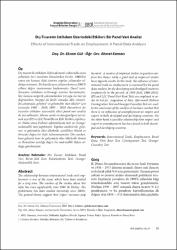| dc.contributor.author | Gül, Ekrem | |
| dc.contributor.author | Kamacı, Ahmet | |
| dc.date.accessioned | 2014-07-10T12:26:32Z | |
| dc.date.available | 2014-07-10T12:26:32Z | |
| dc.date.issued | 2012 | |
| dc.identifier.issn | 13030876 | |
| dc.identifier.uri | https://hdl.handle.net/11421/131 | |
| dc.description.abstract | Dış ticaret ile istihdam ilişkisi ekonomi sahasında uzun yıllardan beri incelenen konulardan biridir. 1980’den sonra söz konusu ilişki üzerine yapılan çalışmalar oldukça artmıştır. Türkiye’de aynı çalışma konusu 2000’ li yıllara doğru incelenmeye başlanmıştır. Genel teori, ihracatın istihdamı arttıracağı üzerine kurulmuştur. Söz konusu ampirik çalışmalardan birçoğu bu teoriyi doğrularken, birçoğu da farklı sonuçlar elde etmiştir. Bu çalışmada, gelişmiş ve gelişmekte olan ülkeler için (sırasıyla 1980 – 2010; 1993 – 2010 dönemleri) dış ticaretin istihdam üzerindeki etkisi panel veri analizi ile test edilmiştir. Alınan verilerin durağanlığını test etmek için IPS ve LLC Panel Birim Kök Testleri yapılmıştır. Daha sonra Pedroni eşbütünleşme testi ve Granger nedensellik testi yapılmıştır. Yapılan analizlerde, gelişmiş ve gelişmekte olan ülkelerde, işsizlikten ithalat ve ihracata doğru bir ilişki bulunamamıştır. Öte yandan, hem gelişmiş hem de gelişmekte olan ülkelerde ithalat ve ihracattan işsizliğe doğru bir nedensellik ilişkisi olduğu görülmüştür. | en_US |
| dc.description.abstract | The relationship between international trade and employment is one of the issues which have been studied for a long time. The number of the studies about this topic has risen significantly since 1980. In Turkey this problematic has been studied intensively since 2000’s. The general theory suggests that ‘export increases employment’. A number of empirical studies in question confirm this theory while a good deal of empirical studies have opposite results. In this study the influence of international trade on employment is examined by the panel data analysis for the developing and developed countries (respectively in the periods of 1993-2010; 1980- 2010). IPS and LLC Panel Unit Root Tests are employed in order to test for stagnation of data. Afterwards Pedroni Cointegration Test and Granger Causality Test are used. In the conclusion of the analysis it has been reached that there is no influences of unemployment on import and export in both developed and developing countries. On the other hand a causality relationship from import and export to unemployment has been found in both developed and developing countries. | en_US |
| dc.language.iso | tur | en_US |
| dc.publisher | Anadolu Üniversitesi | en_US |
| dc.rights | info:eu-repo/semantics/openAccess | en_US |
| dc.subject | Dış Ticaret | en_US |
| dc.subject | İstihdam | en_US |
| dc.subject | Panel Veri | en_US |
| dc.subject | Birim Kök Testi | en_US |
| dc.subject | Eşbütünleşme Testi | en_US |
| dc.subject | Granger Nedensellik Testi | en_US |
| dc.subject | International Trade | en_US |
| dc.subject | Employment | en_US |
| dc.subject | Panel Data | en_US |
| dc.subject | Unit Root Test | en_US |
| dc.subject | Cointegration Test | en_US |
| dc.subject | Granger Causality Test | en_US |
| dc.title | Dış Ticaretin İstihdam Üzerindeki Etkileri: Bir Panel Veri Analizi | en_US |
| dc.title.alternative | Effects of International Trade on Employment: A Panel Data Analysis | en_US |
| dc.type | article | en_US |
| dc.relation.journal | Anadolu Üniversitesi Sosyal Bilimler Dergisi | en_US |
| dc.relation.publicationcategory | Makale - Uluslararası Hakemli Dergi - Kategorisiz | en_US |


















